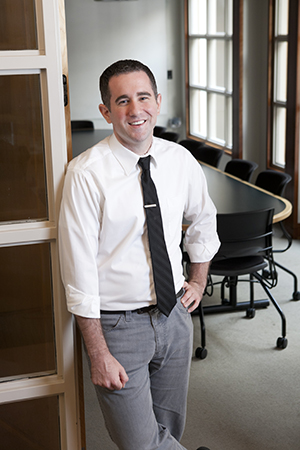Nicholas Carnes, 29, Political Science and Public Policy
Does it matter that most of our politicians were millionaires when they took office? And why is it so hard for working-class people to get elected? Those questions are at the heart of what is turning out to be Nicholas Carnes’ life work.
His book, White-Collar Government: The Hidden Role of Class in Economic Policy Making, explains why having the wealthy run the country hurts America. “Government by the rich really promotes government for the rich, and that’s often bad news for the rest of us,” he says.
Nicholas Carnes. (Photo: Les Todd at Duke Photography)

The rest of us may not have a Ph.D. from Princeton or an assistant professorship at Duke’s Sanford School of Public Policy like Carnes does, but you can bet that he’ll never forget where he comes from. “I’m a proud Kansan,” he says. Growing up, he had what he calls “a messed-up home life” and played in a heavy metal band.
A high school English teacher turned things around for him. “She showed me that I had potential and that there was a way out,” Carnes says. “She got me into writing and debating and public policy. She helped me get a full ride so that I could go to college. She really believed in me at a time when I desperately needed it. My whole life turned out differently because of her.”
At the University of Tulsa, he majored in political science and graduated summa cum laude. “When I started college,” he says, “I thought I wanted to be an attorney. I wanted to help people who were being kicked around by the world.” But while he was in school, Carnes realized that there are different ways of standing up for others. “I got really interested in the idea that people can study social problems scientifically and fight for the little guy not just on a case-by-case basis, but by understanding the larger forces in our society that lead to unequal outcomes.”
“He’s the only professor I know who used to work at Cinnabon in the mall,” says Karen Kemp, an assistant dean at Duke. It’s his blue-collar roots that inform Carnes’ research, that motivate him to identify the reasons that keep middle-class Americans out of office, to think up ideas to help average citizens become a more representative part of government.
“I hope I can convince the public-policy community to take the shortage of working-class Americans in government seriously,” Carnes says of his ultimate career goal. “I hope I leave behind some successful programs to encourage qualified working-class Americans to run for political office, and I hope I have lots of friends who are politicians but who used to be factory workers and restaurant servers.”
“My research shows when we elect politicians who spent some of their adult lives doing working-class jobs, they bring a pro-worker perspective to office that lasts throughout their entire careers,” Carnes says. “If we could elect more politicians from the working class, our political process would be less beholden to what rich people want and more responsive to the views and needs of mainstream Americans. To me, that’s a really exciting possibility.”
What makes it truly enticing to Carnes is that he believes it’s a reality that’s within our reach. “We know how to do this,” he says. “In 1945, the House and Senate were each 98 percent men. In the decades since, party leaders and interest groups have deliberately recruited many female candidates, and today women make up 19 percent of Congress. The same strategies seem to work when you apply them to blue-collar Americans. Congress doesn’t have to be an old boys’ club, and it doesn’t have to be a millionaires’ club, either.”
Carnes’ research has been heartily acknowledged—last year alone, the American Political Science Association handed him three prestigious awards, including two for having written the best dissertation in his field—but he’s a stellar professor too. In 2013, his students’ evaluations placed him in Duke’s top five percent of teachers.
Though Carnes has achieved more than the vast majority of 29-year-olds, his masterpiece, he says, is Joseph, his four-year-old son: “He’s funny, creative, sweet, loving, smart, and good-natured. Being his father is by far my proudest accomplishment. I’m so excited to see what kind of person he becomes.”
See our complete 2014 list of the 30 top thinkers under 30 here.





